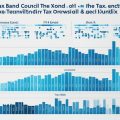Last Updated on: 1st August 2025, 12:15 pm
Have you ever looked at your vehicle’s registration number and wondered how it impacts your car tax? In the UK, your registration plate isn’t just a combination of letters and numbers, it’s the key to discovering what tax band your vehicle falls under.
Whether you’re driving a brand-new electric car or a well-loved family hatchback, understanding your tax band helps you budget properly and stay compliant with DVLA regulations.
Road tax, officially known as Vehicle Excise Duty (VED), varies depending on your car’s registration date, fuel type, CO2 emissions, engine size, and other factors.
It’s easy to find your tax band just by using your reg, and in this guide, you’ll learn how to do just that. From modern EVs to older diesel models and even motorhomes, we’ll help you navigate the UK’s road tax system.
How Can You Check What Tax Band Your Car Is In By Registration?

Finding your car’s tax band by its registration number is straightforward and doesn’t take much time. The UK government provides an official tool that lets you enter your reg and instantly see your vehicle tax details.
Start by locating your registration number, which is printed on your vehicle’s number plate and V5C logbook (also called the registration certificate).
Once you have it:
- Visit the official DVLA vehicle information checker.
- Enter your reg number in the field provided.
- Review your car’s details, including tax band, fuel type, emissions, and tax expiry.
The registration date is particularly important as it determines which tax rate table applies to your car. A car registered in 2005 is taxed differently than one registered in 2019, even if they have similar engines.
Why does this matter? Knowing your tax band can help you:
- Understand how much road tax to pay
- Budget for renewals every 6 or 12 months
- Avoid fines for unpaid or incorrect tax
In just a few clicks, you can find the exact amount due and ensure you’re paying the correct tax, no surprises, no guesswork.
What Are The Car Tax Bands For Vehicles Registered After 1 April 2017?

If your vehicle was first registered on or after 1 April 2017, your road tax is calculated using a two-part system: the first-year tax rate, which is based on CO2 emissions, and a standard rate applied from the second year onwards.
First-Year Tax Rates Based on CO2 Emissions
When you first register your car, the DVLA uses CO2 emissions to determine your initial road tax. This applies to petrol, diesel, hybrid, and zero-emission vehicles. Diesel cars that don’t meet the RDE2 standard will pay higher rates than petrol or compliant diesels.
Here’s the breakdown:
| CO2 Emissions (g/km) | Petrol/Alternative/Compliant Diesel | Non-Compliant Diesel |
| 0 | £10 | £10 |
| 1 to 50 | £110 | £130 |
| 51 to 75 | £130 | £270 |
| 76 to 90 | £270 | £350 |
| 91 to 100 | £350 | £390 |
| 101 to 110 | £390 | £440 |
| 111 to 130 | £440 | £540 |
| 131 to 150 | £540 | £1,360 |
| 151 to 170 | £1,360 | £2,190 |
| 171 to 190 | £2,190 | £3,300 |
| 191 to 225 | £3,300 | £4,680 |
| 226 to 255 | £4,680 | £5,490 |
| Over 255 | £5,490 | £5,490 |
Standard Tax Rates After the First Year
From year two onward, vehicles fall under a fixed annual tax rate depending on fuel type:
- Petrol and Diesel: £195 (or £204.75 if paid monthly)
- Alternative Fuel (hybrids, LPG, bioethanol): £185 (slightly lower)
- Electric Vehicles: £0 (fully exempt)
You can choose to pay annually or split the payment:
- £195 single annual payment
- £204.75 split into 12 monthly Direct Debit payments
- £107.25 for a 6-month payment
Extra Charges For Cars Over £40,000
Cars with a list price above £40,000 are subject to an additional charge of £425 per year, applied for five years starting from the second year of ownership.
- This applies regardless of fuel type.
- Zero-emission vehicles are exempt if registered before April 2025.
Luxury vehicles carry a premium in the eyes of the DVLA, so make sure you know your car’s list price before calculating your tax.
What Are The Vehicle Tax Bands For Cars Registered Between 1 March 2001 And 31 March 2017?

If your vehicle was registered in this period, road tax is based on your car’s fuel type and CO2 emissions. Unlike newer vehicles, there are predefined tax bands from A to M that determine how much you pay.
CO2 Emissions And Tax Band Breakdown
Here’s how CO2 emissions correlate with tax bands:
| Band | CO2 Emissions (g/km) | 12-Month Tax | Monthly DD Total | 6-Month Tax |
| A | Up to 100 | £20 | £21 | N/A |
| B | 101–110 | £20 | £21 | N/A |
| C | 111–120 | £35 | £36.75 | N/A |
| D | 121–130 | £165 | £173.25 | £90.75 |
| E | 131–140 | £195 | £204.75 | £107.25 |
| F | 141–150 | £215 | £225.75 | £118.25 |
| G | 151–165 | £265 | £278.25 | £145.75 |
| H | 166–175 | £315 | £330.75 | £173.25 |
| I | 176–185 | £345 | £362.25 | £189.75 |
| J | 186–200 | £395 | £414.75 | £217.25 |
| K* | 201–225 | £430 | £451.50 | £236.50 |
| L | 226–255 | £735 | £771.75 | £404.25 |
| M | Over 255 | £760 | £798 | £418 |
Petrol, Diesel, And Alternative Fuel Vehicles
The fuel type also influences your tax. Alternative fuel vehicles (AFVs) like hybrids or LPG-powered cars may qualify for slightly reduced rates. However, the primary determinant remains the CO2 emissions.
How To Locate Your CO2 Emissions Data?
You can find your car’s CO2 emissions:
- On your V5C registration certificate
- Through the DVLA checker
- Via your car dealer or manufacturer website
Knowing this value is essential for calculating your VED properly and avoiding any miscalculations during tax renewal.
How Is Vehicle Tax Calculated For Cars Registered Before March 2001?

For older cars registered before 1 March 2001, your tax isn’t based on emissions but on engine size.
There are two simple categories:
- Not over 1549cc – £220 per year
- Over 1549cc – £360 per year
| Engine Size (cc) | 12-Month Tax | Monthly DD Total | 6-Month Tax |
| Not over 1549 | £220 | £231 | £121 |
| Over 1549 | £360 | £378 | £198 |
This system is more straightforward but may result in higher costs for larger engine vehicles. Make sure your car’s capacity is listed correctly on the logbook to avoid tax issues.
What If You Drive A Motorhome? How Does Tax Apply?
Motorhome tax depends on the revenue weight and engine size. If it’s 3,500kg or less, it’s taxed like light goods vehicles.
| Vehicle Type | 12-Month Tax | Monthly DD Total | 6-Month Tax |
| Engine ≤ 1549cc | £220 | £231 | £121 |
| Engine > 1549cc | £360 | £378 | £198 |
| Over 3,500kg (Private HGV) | £171 | £179.55 | £94.05 |
If registered between 1 April 2017 and 11 March 2020, and classed as M1SP with CO2 ratings, tax is based on emissions, much like newer cars. Always check your certificate of conformity for emission details.
What Are The Tax Bands For Other Vehicle Types?
Besides cars and motorhomes, other vehicles also fall under VED:
| Vehicle Type | 12-Month Tax | Monthly DD Total | 6-Month Tax |
| Light Goods (Post-2001) | £345 | £362.25 | £189.75 |
| Euro 4 & 5 Light Goods (LPG) | £140 | £147 | £77 |
| Motorcycle (under 150cc) | £26 | £27.30 | N/A |
| Motorcycle (151–400cc) | £57 | £59.85 | £31.35 |
| Tricycle | £121 | £127.05 | £66.55 |
If you’re operating any of these vehicle types, it’s crucial to consult the DVLA tables and ensure the correct class is assigned on your logbook.
How Can You Calculate The Road Tax For Your Vehicle?
Calculating your road tax doesn’t need to be complicated if you know what factors affect the cost.
The main elements include:
- Registration date
- CO2 emissions or engine size
- Fuel type
- Vehicle list price (if over £40,000)
Using the DVLA’s rate tables or an online checker, simply input your reg number to get your current rate. Below is a comparison of the most common tax scenarios:
| Vehicle Type | Tax Basis | 12-Month Rate |
| Post-2017 Petrol Car | Emissions | £195 |
| EV (Any Registration Date) | Exempt | £0 |
| Pre-2001 (under 1549cc) | Engine size | £220 |
| £40k+ Car (Standard Fuel) | + Luxury Surcharge | £620 |
Always double-check the registration date, as it decides which tax rate applies. Calculators online can be useful, but referring to DVLA’s data is the most accurate method.
What Happens If You Don’t Pay The Correct Vehicle Tax?

Failure to pay the correct road tax can lead to serious consequences. DVLA enforcement includes fines, penalties, and even vehicle clamping.
Here’s what can happen if you skip or underpay your tax:
- Automatic fines starting at £80
- Clamping or impounding of your vehicle
- Court prosecution for continued non-payment
| Offence Type | Penalty Amount | Enforcement Action |
| Late Payment | £80 fine | Possible reminders |
| Driving Untaxed Vehicle | £1,000+ fine | Vehicle seizure |
| No SORN Declared | £100 fine | Monthly surcharges |
To stay compliant, always tax your vehicle on time or declare it off-road (SORN) if it’s not in use.
How Often Should You Check Your Vehicle’s Tax Band?
Although vehicle tax bands don’t frequently change for existing vehicles, it’s good practice to check your vehicle’s tax status regularly.
You should especially check when:
- You buy a used car
- Your vehicle ownership changes
- The DVLA updates tax rates annually
| Scenario | Check Needed? | Why? |
| Annual Renewal | Yes | Rates may update yearly |
| Buying/Selling Vehicle | Yes | Ensure accurate band |
| Emission/Logbook Corrections | Yes | Prevent over/underpayment |
A quick DVLA reg check takes seconds and can save you from unexpected penalties or overpaying.
Conclusion
Understanding what tax band your car falls into using your registration number is essential for every UK driver. Whether you’re running a zero-emission EV or a diesel SUV, each vehicle has its own set of tax rules based on registration date, emissions, engine size, and list price.
By checking your reg through official DVLA tools and using the right tax band tables, you’ll stay informed and avoid unwanted surprises.
Accurate road tax payments ensure legal compliance and help you budget efficiently year after year. Don’t let confusion lead to fines. Take a moment to check your tax band today and drive with confidence.
FAQs
Can I Check My Vehicle Tax Band for Free?
Yes, you can check your tax band using the DVLA’s free online service. All you need is your vehicle’s registration number.
What If My Car’s CO2 Emissions Aren’t Listed?
You can find this information on your V5C logbook or contact the manufacturer for the original emissions data.
Do Hybrid Cars Have Lower Road Tax?
Yes, hybrid vehicles usually benefit from slightly reduced tax rates compared to petrol and diesel vehicles.
Is Road Tax the Same Across All UK Countries?
Yes, road tax rules apply uniformly across England, Scotland, Wales, and Northern Ireland.
What Is SORN and How Does It Affect Road Tax?
SORN stands for Statutory Off Road Notification. If declared, you don’t have to pay road tax while the car is off-road.
Do I Still Pay Tax on a Zero-Emission Vehicle?
Fully electric vehicles registered before April 2025 are exempt from road tax.
Can I Get a Refund If I Sell My Car?
Yes, the DVLA will issue a refund for any full remaining months of road tax once you notify them of the sale.




















No Comments
Leave a comment Cancel